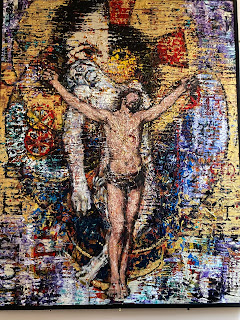A Quiet Place in a Busy Life (St. Cuthbert's Island)
Read: Psalm 46
This blog is a reflection on time spent in Ireland and the United Kingdom in the summer of 2019. Over that time, I had the opportunity to visit these holy places and learn about the lives of people who made an impact in the name of Jesus.
The cool wind blew off the North Sea bringing a small bit of relief to an otherwise hot summer’s day. As my family and I sat down to rest on the small island just off Lindisfarne, or Holy Island, in northern England, we were aware that we were sitting on holy ground. This small island, accessible by foot only during low tide was where Saint Cuthbert came to pray nearly 1500 years ago. The wooden cross marks where the prayer altar once stood and the stones are all that remain of Cuthbert’s small house. In the distance the ruins of the old Lindisfarne monastery, church, and castle seem another world away. We sat still and quietly listening to the blowing wind, crying gulls, and crashing waves, the same sounds that Cuthbert would have heard so long ago.
Saint Cuthbert became a monk after a spiritual vision at the age of sixteen, while working as a shepherd in the Northumbrian hills. One night, while watching over his sheep, he saw in the sky a band of angels carrying the body of a holy man who had just died into the Kingdom of God. He later learned that the great saint Aidan (the Bishop of Lindisfarne), had passed away at the same time he saw the vision. In response, Cuthbert was so moved that he gave up everything to follow God.
As Cuthbert grew in faith and wisdom, he eventually became the Bishop of Lindisfarne, like the beloved Aidan. People came from all over to consult him for advice and spiritual guidance. He was known for being kind and compassionate. He cared about people and took seriously Jesus’ command to love God and neighbor. As a result, people sought him out and his life became very busy.
Yet, Cuthbert was also a man of prayer. He took time to withdraw to this small island, now called Saint Cuthbert’s island, to listen for God in solitude. It was said that he often prayed standing in the water up to his waist. He became so at home there it was said otters would dry his legs when he came out of the water and birds would bring him fish. Whether that is true or not is hardly the point. Cuthbert made space for prayer, solitude and stillness in his life and he was deeply connected with God.
Saint Cuthbert points to a balance for life today, as well. We want to do something meaningful and engaging with our lives, but in order to do so, we must make time and space to grow our spiritual lives. Otherwise, we become very active and easily burn out or become frustrated and overwhelmed. Life today is busy, for sure, but in carving out space to be still and listen for God, our active lives become deep and meaningful. As human beings, we are made by and for God. We are made to be active in ways that makes God’s love visible. At the same time, we are made for stillness, quiet and prayer with God. If we don’t attend to both sides of these sides of life, something will always feel disjointed.
One of Cuthbert’s first biographers was a monk named Bede. He described Cuthbert in this way, “Above all else, he was afire with heavenly love, unassumingly patient, devoted to unceasing prayer, and kindly to all who came to him for comfort.” May the same be said of us as we live in active and engaging ways and as we retreat to the solitude of prayer. In the balance, we will find a God filled life.



Comments
Post a Comment